
臺灣非營利專業書評媒體。Openbook編輯部將提供原生報導,文化觀察,人物採訪與國內外重大出版消息。 https://linktr.ee/openbooktaiwan
Topic" Before the world revolution, you have to burn guilty souls: "V Freak" is a public theater for "transitional justice"
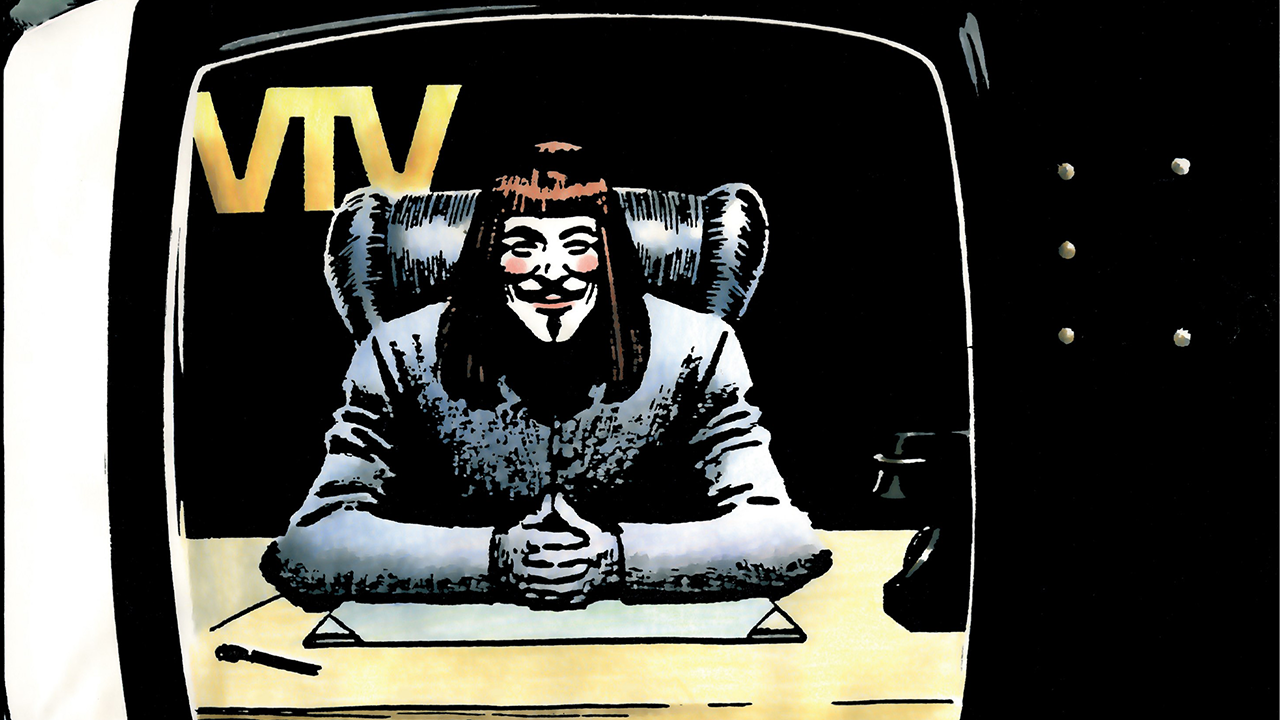
Author| Lin Yunhong (literary worker)
Plato has a famous saying: lack of philosophical thinking is like being chained in a dark cave since childhood, only seeing shadows twisting on the stone walls. At this time, humans will think that the world has only walls, and that they are black projections on the walls. But if one day, someone broke free from the chains, ran out of the cave and saw the blue sky and the sun, and saw his full body, then when he returned to the cave, he would definitely tell his companions excitedly that the world has color and thickness, not a shadow on the wall— ─ But other residents who "don't understand philosophy", or have never left the cave, didn't believe it, and even threatened to kill the heretic.
The classic comic "V Strange", which has been published for 30 years, "recreates" Plato's cave by dismantling the lies of the totalitarian state. When Ivy, the protagonist in the book, was tortured, shaved, and sentenced to be "dragged behind a chemical warehouse to be shot" for "treason", she discovered that the entire trial was just a stage scene with tape recorders and plastic dummies. "Prison" is an extremely realistic "play" directed and acted by spiritual mentor V, who was deceived by the person she believed most, and Ivy fell into a breakdown.
But "philosopher" V is righteous. His explanation is so cruel: "All criminals are hunchbacked in cramped cages, heavy chains, unjust sentences...I didn't put you in jail. I just showed you the iron bars", "You were born in a cage. "You've been in a cage for so long that you no longer believe that there are other worlds out there." V said earnestly, "Happiness is a prison, Ivy. Pleasure is the most secret and undetectable prison in the world."
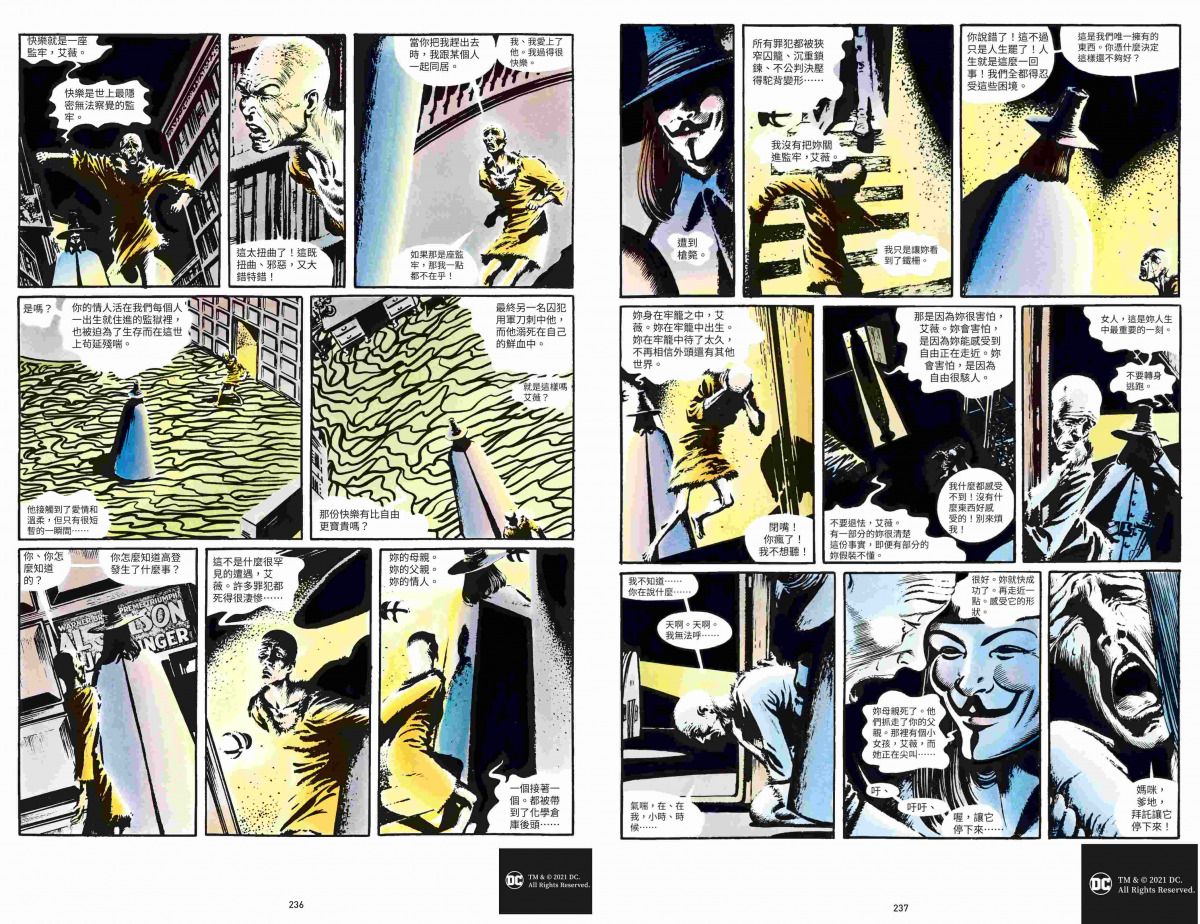
➤ A geek who can't even control a ghost
"V Strangers" screenwriter Alan. Alan Moore is a master of European and American comics. Moore's thinking is grand and erudite, and he has all the classic passages of Shakespeare, Nietzsche, and Jung at his fingertips. His creations often echo today's political crises and philosophical debates. The melancholy poetry of its narrative can even catch up with Greek tragedy—a weak and flawed individual who is still willing to adhere to the bottom line of human nature in the midst of the countdown of the doomsday clock and the despair of a dystopian sunset.
Moldo's works have left a far-reaching impact. For example, Batman comics, which were originally written for teenagers after World War II, originally had flat characters, but after his "Batman: The Killing Joke" ( Batman: The Killing Joke ), the hero and villain of Gaotan City "acquired" existential absurdity and childhood. Psychological trauma, and today's series of movies are very popular, and Moore's transformation is a great credit. Not to mention, " Watchmen ", which is aesthetically a cliffhanger for superhero comics. American hegemony and superheroes suffer mid-life crises such as baldness and impotence. They abandon idealism and devote themselves to capital or the country. The work also intertwines elements such as time paradox, prisoner's dilemma, free will, etc., and even puts forward the sharpest criticism of the real "American Superman" of the "world police".
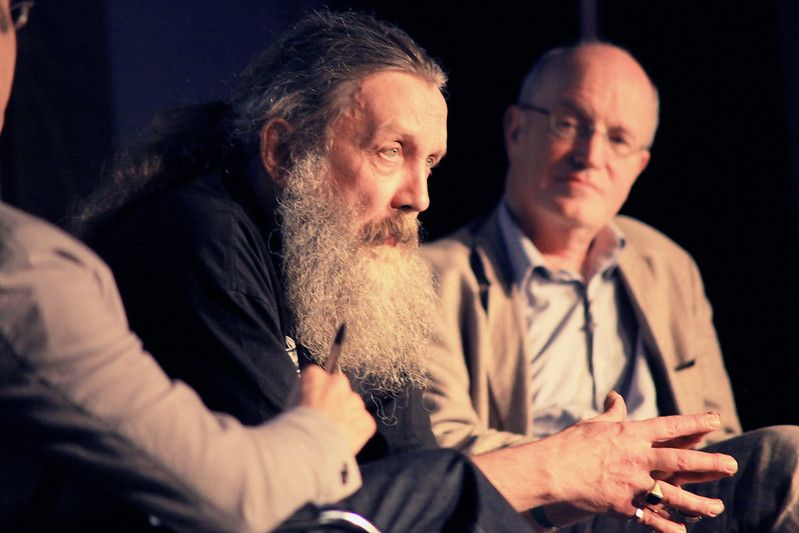
As for the early masterpiece "V Weird", after the film adaptation of the director The Wachowskis (The Wachowskis), the protagonist V's face "Guy Fox mask" and lines such as "The people should not be afraid of the government, the government should "Fear of the people" has become a symbol circulating around the world, whether in the Arab Spring, the Yellow Vest Movement, Occupy Wall Street, or the Hong Kong Umbrella Revolution, it has become the literal symbol of the spirit of resistance.
However, Moore's works are not so easily included in the mass culture industry. For die-hard Moore fans, the movie version of The V Strangers isn't without its kitsch. Because the movie deletes key characters and focuses too much on martial arts, it also simplifies the complex personality of the villain (in the comics, the "leader" has a near-faith-like love for the supercomputer "Fate", and is a paranoid and twisted idealist). Even the Hollywood ghost and talent sisters can't easily control the book on the big screen. It can be said that the true spirit of "V Weird" has to go back to the original book to inquire.
Reading this comic carefully, the movie's emphasis on "people's awakening and mass revolution" may be somewhat of a misunderstanding. Because resisting state totalitarianism is actually very lonely, V's only "accomplice" is the wandering warbler Ivy who was accidentally rescued, where are the people and the public? Usually when we talk about "revolution", we conceptually refer to the fundamental reshaping of the political structure in a short period of time. However, the original work rarely touches on the political process. To recognize the "evil of banality" created by indifference and bystander?
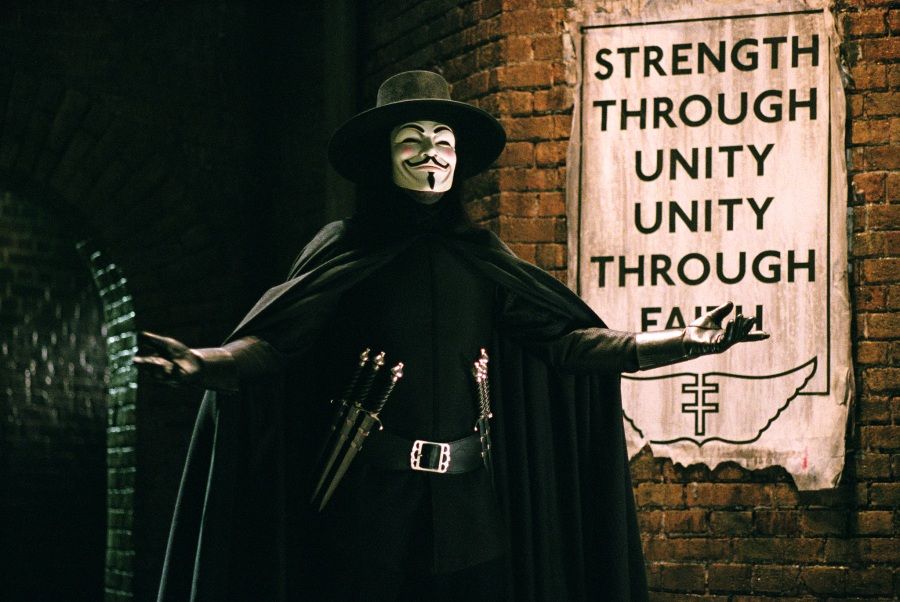
➤ Only "fiction" can awaken "real"
Let's first interpret this comic from the function of the role-may think of V, who survived the concentration camp, as a political victim trying to preserve the truth of history, then, Ivy is a young generation who does not understand the evil of the past. This is the question of "transitional justice" that many contemporary democracies have to go through that have bid farewell to authoritarianism. How can we summon the masses who are content with today's harmony and happiness, and have no sense of unforgivable historical mistakes? The comic version of "V Strangers" is essentially a story that leads from political coldness to profound enlightenment.
If you follow this point of view, you need to think about how the two important characters in the comics, civilian Ivy and Inspector Finch who served as the "nose", how their respective "transformations" were achieved.
Ivy went from a timid and cowardly girl to finally put on the Fox mask and volunteered to take over the dead V. It was a very hard inner struggle. In the story, Ivy once left V's hideout and returned to her daily life of sweet love and lively nightclubs, but was "arrested" again by the secret police. In the dark prison, she was tortured, tortured, interrogated, and tortured physically and mentally. Just then, she received a letter from "the cellmate next door" written on toilet paper. The inmates call themselves Valerie. She is a lesbian and has been a movie star, but with the rapid fascization of Britain, Valerie is accused of corrupting young women, and her beloved soulmate also surrendered in the torture, so she committed suicide.
Although Valerie suffered such a tragedy, in her letter she encouraged Ivy not to give up the "last inch" of her heart, to still believe in human nature, and to still kiss other human companions. Ivy was so moved by the letter that she refused to sign the confession arranged by the Inquisitor. She gritted her teeth and said, "I'd rather die behind the chemical warehouse"—and suddenly a familiar voice said, "Then there's nothing to threaten you, right? You're free."
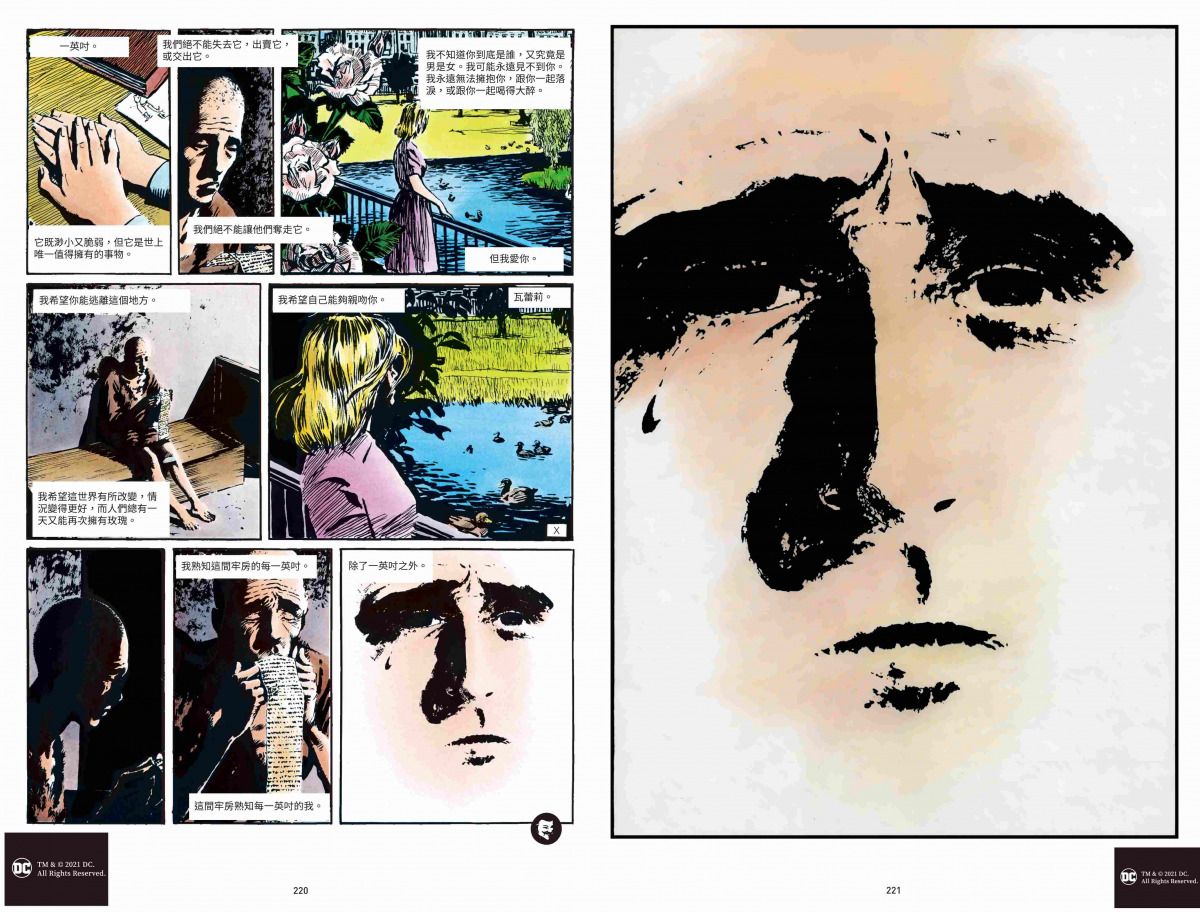
It turned out that this dark prison was completely designed by V, and everything only happened in that V's hideout that looked like a theater. However, Valerie's letter was not fabricated out of thin air, it was V's personal experience in the concentration camp that year. However, just like Ivy in the past, most British citizens who are drowning in their daily happiness have never been willing to "remember" the countless tragedies caused by totalitarian rule. So V directed and acted by himself, arranging a realistic drama that forced Ivy to dig deep into her conscience.
As a control group, Inspector Finch, who is older and loyal to the party state, found the abandoned concentration camp according to various clues in order to hunt down V and avenge his mistress (the scene is drawn with reference to the actual German concentration camp). Finch vaguely knew that the mistress was hunted by V, related to her past actions in the concentration camp. But what are those "actions"? Finch claimed to have no clue, that he did not know.
So, Finch only saw the "hallucination" after taking the illegally obtained psychedelic drugs. He first thought of the old Britain, where dissidents, comrades and people of color could all lead happy and ordinary lives, but after the "one nation, one country, one will" fascist party came to power, "others" were sent to concentration camps, where they were sent to concentration camps. Stringed on wire, countless corpses burned in incinerators.
Finch, who "saw" the past, asked himself in tears, if he had known that these things would happen, would he still join the party? (Unfortunately, it will!)
So Finch admits that psychedelics only magnify memories, not create something out of nothing—if he really knew nothing about the crimes against humanity committed by the state, how could these visions come to life? Yes, Finch is not innocent. Like all those who acquiesce to the totalitarian system, he has blood on his hands, and they have always given informed consent to the purification of the carnage. Under the catalysis of the drug, Finch finally understood his moral responsibility. At this time, he raised his hands to make a V and shouted "I'm free". At the end of the comic, the fascist remnant wanted to unite the masses to suppress the rebellious masses, but Finch left indifferently and decided not to continue to be the dictator's lackey.
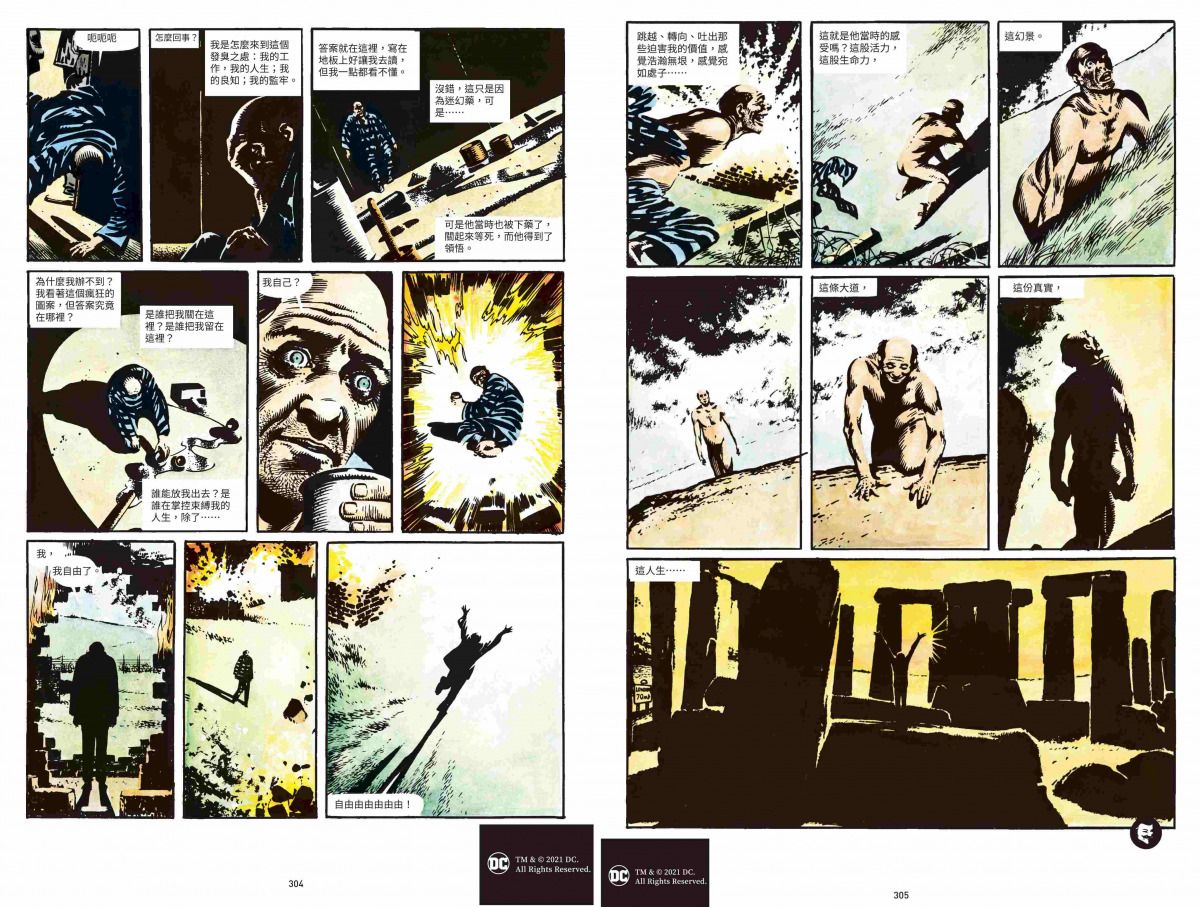
The two very wonderful "self-redemption" in the comics all come from a kind of "fiction", whether the root of the fiction is acting or drugs. "V Strangers" raises a truly profound ethical issue: superficial political correctness is actually difficult to impress the public (just like the indifference of the Taiwanese people to the transformational justice project in recent years). The Nazis are bad, the dictatorship is bad, no one knows it, but most people don't have a special feeling for the literal description of "very bad" - but Ivy and Finch have gone through a thrilling "fiction". This fiction helped them truly travel back in time, so they were able to read the writings of victims in black jails and witness genocide and human experimentation in concentration camps. It can be said that if we do not evoke a profound "historical memory", we who follow our path usually have no chance to reflect on the silence or connivance of mankind under the centralized system.
➤ "Public theatre" can drive historical change
"V Strangers" quotes a lot of Shakespeare's lines. Taiwanese readers who are not used to watching dramas often read Shakespeare as "literature", but we must know that they were originally drama works. Different from other narrative genres such as novels, comics and even movies, the characteristic of theater is to be immersed in the situation, allowing the audience to “participate” and “enter” a specific scene to the greatest extent, which is an experience that cannot be compared to reading text. "Drama" is the key metaphor of this book.
This is why the "revolution" initiated by V is actually a "performance" for the public sphere. At the beginning of the story, V blows up the Central Criminal Court, then seizes the TV station, and at the end of the story storms the Parliament Building, all of which have a "symbolic" meaning. Capturing and reinterpreting symbols monopolized by the ideology of the rulers, or turning the bystander into the presence of political issues, is the cultural condition that enables the heart to stir. Take a closer look at V's hideout, with vanity mirrors, ballroom lights, piano, and jukebox -- it's the "backstage" of the splendid opera. V has always been planning a public drama that can subvert the status quo.
Sociologist Richard Sennett pointed out that theater is closely related to public life. Since modern times, European urban residents have learned a suitable "public image" by watching theater performances, and have "self-show" after being aware of the eyes of others. Political scientist Charles Tilly further said that the transition of regimes in history requires a "script" that guides the steps of social change from tradition or culture, that is, a set of propaganda ideas, exchanges of opinions, and formation of appeals, so as to be able to A draft of "How Collective Action Works" from the gathering of the masses to the initiating conflict.
Therefore, the title of the second volume of "V Strangers" is called "Vicious Cabaret". The so-called Cabaret is a kind of European drama that is watched during meals and has elements of comedy, song, dance and so on. At the beginning of the second volume, V sings about his plans while playing the piano. Looking closely at the details of the screen, there is a surveillance screen beside V, whether it is the intrigue within the party-state, Ivy's obsession with the forbidden movies in the hideout, Sheriff Finch's disapproval of the current order, the leader's concern about the "destiny" of the supercomputer. Unconditional obedience...all under the watchful eye of V, who is composing a sophisticated script that would tip the balance of the structure based on the weaknesses of these actors. These characters then turned into puppets, and there were big and small conflicts according to the script, which accelerated the cracking of fascist Britain.
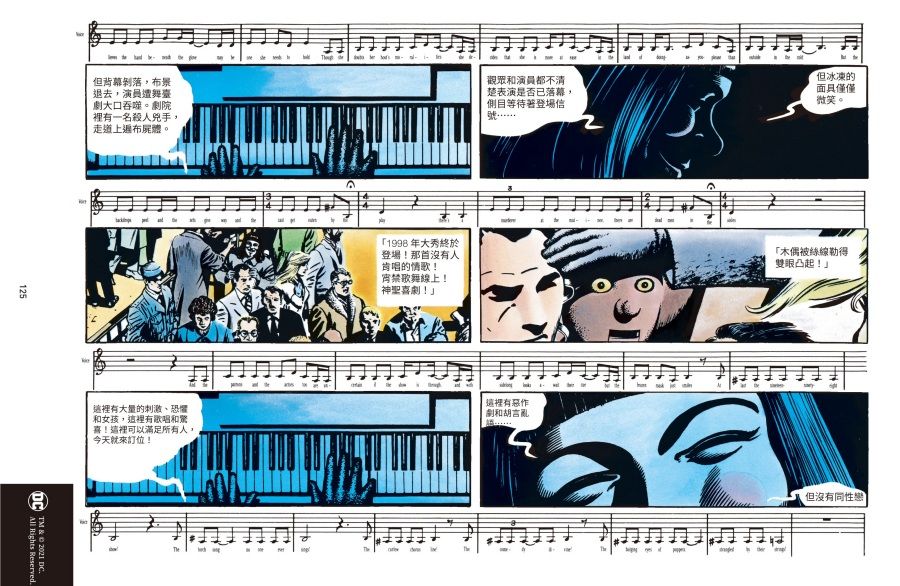
Of course, we have to admit that in order to pursue substantive justice, V also gave up procedural justice. The revolution is not a dinner party. V lynched the concentration camp participants, stood by and watched Ivy's boyfriend killed by corrupt police, kidnapped and imprisoned civilians in order to "enlighten the wisdom of the people", and of course he invaded the surveillance devices all over the country... If in a democratic society ruled by law , these excesses are themselves crimes. However, this story needs to be overcorrected. Since the "social contract" in which people transfer rights to the government has been destroyed by the dictatorship, Britain, which has no morality and only power, needs new laws. Apparently, V believes that the process is not immune to violence and hatred (V seems polite, but revengeful will be fervent).
But that's why, V's "revolution" is represented as a domino effect in the comics. The principle of this trick is that the kinetic energy of each falling domino must be enough to push the next domino. So V arranged the intertwined causal thread, gradually revealing the hidden historical truth, shaking the beliefs of the participants and complicit, challenging the authority of the ruler, and then giving a gap for outbreaks and collisions at the last moment.
Perhaps what I want to say here is that justice never knows how to reveal itself. Instead, it requires careful arrangements by "truth commissions" and "transitional justice promoters", and even "over-interpretation". Precisely because issues such as the tyranny of the rulers, the weakness of their own vassals, and the great suffering of the victims are too heavy for the people who yearn for comfort, V carefully arranged an epic revelation to force People who don't want to open their eyes see the "truth" so filthy.
➤ Transformational justice is not cheap forgiveness
Although he is against good customs, V defended his unique view of justice to the "audience" very early. V once took Ivy to London's Central Criminal Court, where he performed a one-act play that spoke to the air. Facing the statue of the Goddess of Justice, he solemnly accused her of her infidelity and her intrigue with the state's violence. Then V admitted that he had lost his love, and now he is in love with "anarchism".
But what V didn't say is that the concept of "justice" has the meaning of "revenge". The founder of modern Western law, the Code of Hammurabi, clearly stipulated very early that "if you destroy other people's eyes, your own eyes will also be damaged", and as an anarchist believer, V does not believe in public power, and also Do not believe that the state organization can exercise judgment better than human conscience, so in the story, V prosecutes and executes those responsible for those who participated in the concentration camps.
There are nearly 40 chapters in "V Strangers", and all chapter titles begin with the letter V. Moore uses a light word game to answer the comic's fundamental question: what does the so-called "V" stand for? V is Violence, Venom; Values and The Vision; The Verdict, and Vengeance. This goes back to the English title, V for Vendetta, where the word V means blood feud. All Vs are Vs of vengeance, and vengeance happens to be the oldest and most primitive core of the concept of justice.
This simple and primitive conception of justice is of course linked to classical Greek tragedy. V is very similar to Prometheus, who rebelled against Zeus, and Oedipus, who rebelled against the oracle. Even though fate was so unfair, they still displayed unyielding free will. Such a magnificent "revenge" that leads to death and remains in eternity.
However, "revenge" is not limited to violent punishment. What is indispensable to the realization of justice is the repentance from the heart of those responsible. Among the characters who must be responsible for the "fascization of Britain" and the "genocide concentration camps", only Inspector Finch's mistress, Doctor Delia, who had conducted human experiments in the concentration camps, confessed his guilt at the end of the trial.
In the story, V killed the officials who participated in the concentration camp one by one, and Delia knew that she was doomed. When V appeared on the bedside, she said she was no longer afraid, but "felt relieved." She hid the screams and cries of the subjects in the concentration camps in her heart for many years, and she even wondered if she felt faintly happy at the time? So Delia didn't resist, there was only one request: "Can I see your face again?", and then she didn't resist and surrendered her life. V's face was completely burned in the concentration camp fire that year, so presumably Delia saw her own faults and the fortitude and justice of the goddess of nemesis in her ugly facial features.
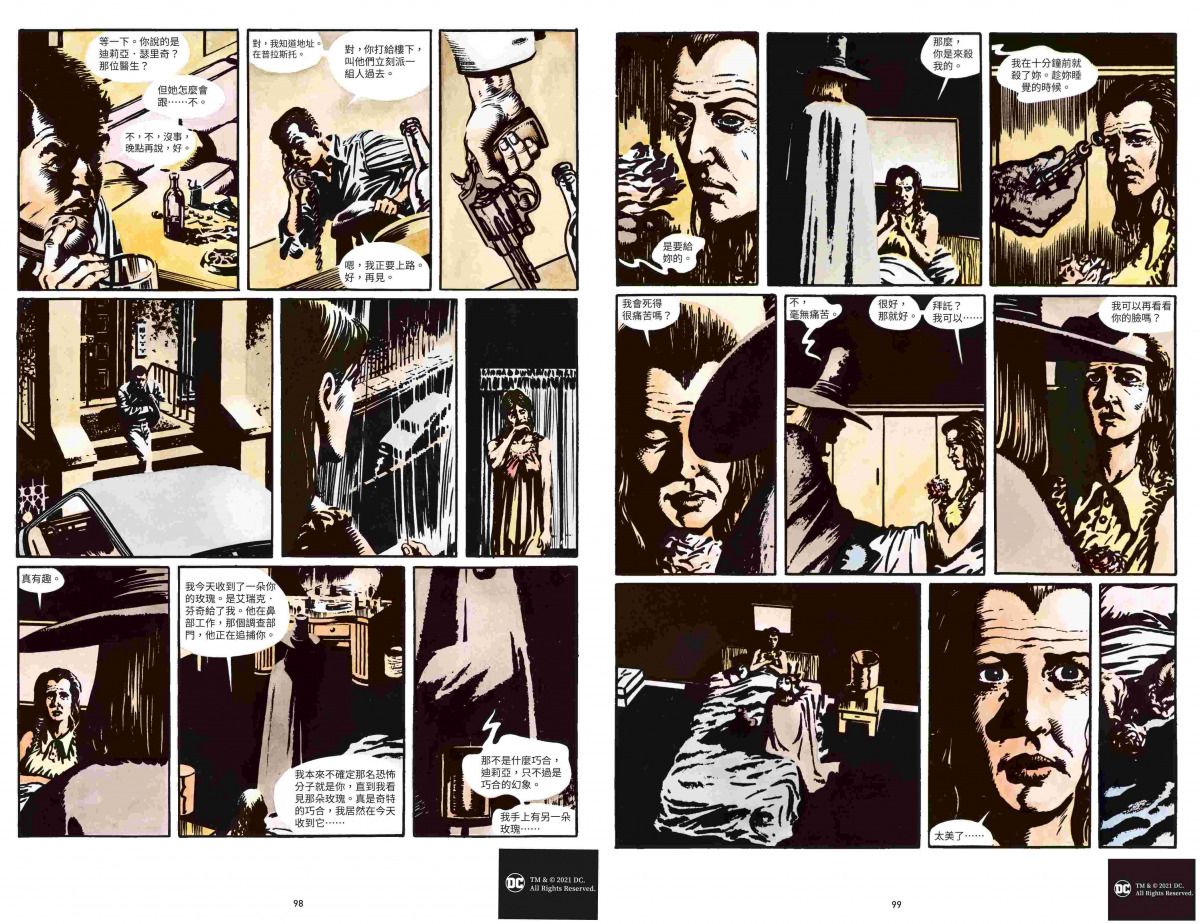
As for whether Delia was forgiven? We don't have to narrow forgiveness to forgiveness. Although V did take his life with poison injection, Delia was the only one who died peacefully and peacefully among all the perpetrators. In any case, the justice of lynching has the most powerful endorsement here - the perpetrator's confession, repentance, and efforts to make amends (although life in vain and life taken away can never be compensated).
As an artist whose works are always full of moral and philosophical thinking, Moore's ideas expressed through "V Strangers" are not "politically correct", and even hover on the edge of the precipice of good and evil. Regarding the revolution, Moore is not talking about the historical and social conditions, but the ethical and psychological conditions of the revolution. As for justice, what Moore recognizes is not the contemporary popular restorative justice (with the goal of pacifying conflicts), but the ancient retributive justice (with the goal of responding to guilt).
And what makes all this possible is V's tragic moral drama in the public sphere, which is violent but directly hits people's hearts. Moore's idea may be that all "revolutions" originate from people's cognitive transformation and a thorough reflection on stereotypes, because only the willingness of people to change is the absolute prerequisite for social change. "V Strangers" painter David. Lloyd (David Lloyd), his preface to this book is equally meaningful. Lloyd wrote that one night, when he was sitting in a working-class bar and ordering a beer, the boss turned the news about the Nazis into a slapstick variety show—yes, the heaviest, most solid yoke Often from those who are suffering, perhaps because life is too bitter and astringent, the oppressed at the bottom often show indifference to reality, history, and politics.

How can people who are accustomed to the status quo and the system see the ruthless foundation of today's Chengping society? Or to use Plato's question, how does philosophy make one see the world as it really is? The answer proposed by "V Strangers" is a grand tragedy that can renovate the soul and awaken the memory. Just like Ivy and Finch, they are willing to immerse their pale self into the pain of others, instead of watching or forgetting. Of course, "facing evil head-on" will be a huge burden on the mind, but because of this, the truth can shake the ferocious system that has been covered up by habit. Let's quote V's motto again: "Happiness is a prison, Ivy. Happiness is the most secret and undetectable prison in the world."

V Strangers: 30th Anniversary Deluxe Edition in English
V for Vendetta 30th Anniversary Deluxe Edition
Author: Allen. Alan Moore
Illustrator: David. David Lloyd
Translator: Quiff
Publishing: Trojan Culture
About the Author Alan. Alan Moore
British comic book writer, novelist, screenwriter, and musician. Alan. Moore is arguably the most admired creator of graphic novels, with awards for Guardians, The V-Freak, The Ripper, Marvel, and Swamp Alien. He's also the founder of America's Best Comics (ABC) publishing house, where (along with many talented painters) he's created Raiders, Promecia, Tom. Strong", "Story of Tomorrow" and "10th Police Station".
One of the most important innovators in the comics industry since the early 1980s, Alan. Moore has deeply influenced an entire generation of comic book creators, and his work continues to inspire a growing readership today. He settled in the Midlands of England.
Like my work?
Don't forget to support or like, so I know you are with me..
Comment…